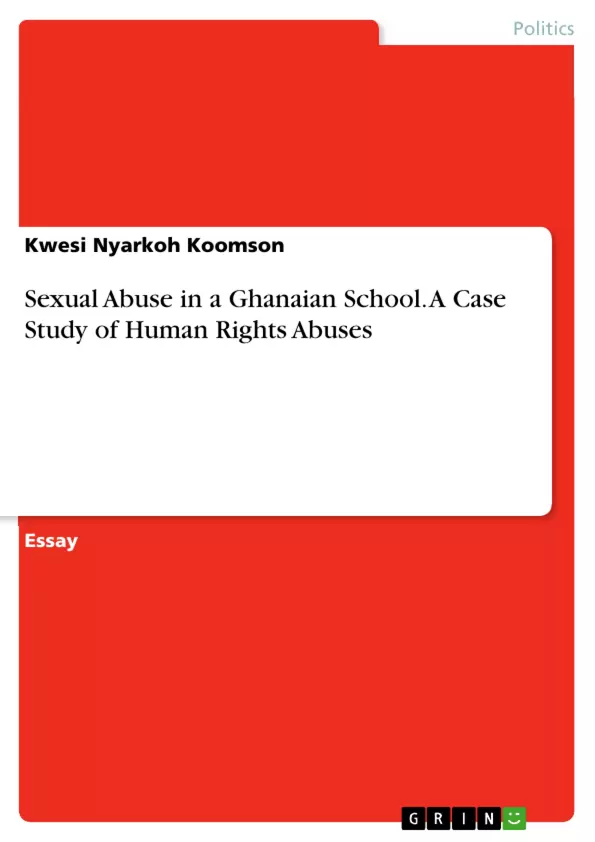The school is supposed to be a place of enlightenment, however it is gradually gaining notoriety as a hub of some of the worst forms of human rights abuses and violations.
Within the school context, the educator and the learner enter into a relationship. This relationship is uneven in nature, due to the fact that the educator is in a position of authority and a learner is in a subordinate position. The authority of the educator is derived from his professional status and legislation. The authority of an educator is also based on the parents of the learner haven delegated their parental authority to the educator who then possesses delegated authority. In this regard, the principle of in loco parentis applies. The educator acts in the place of parents but cannot be entrusted with all parental authority.
This write-up critically discusses an audio tape involving a teacher (an educator) and a pupil (learner) in a Ghanaian basic school. The girl at the time was in Junior high school one and claimed to be fifteen years old. The male teacher and his female pupil’s captured phone conversation unveils several violations and abuses of human rights and raises a number of human rights-related issues.
Inhaltsverzeichnis (Table of Contents)
- Introduction
- Transcript of the Audio-tape
- Summary of Contents of the tape and the human rights related issues
- Exact human rights issues in the recording
- Promotion and protection of the violated human rights on the audio tape
- Conclusion
- References
Zielsetzung und Themenschwerpunkte (Objectives and Key Themes)
This write-up critically analyzes an audio tape involving a teacher and a student in a Ghanaian basic school. The conversation reveals multiple violations of human rights and raises important issues regarding the power dynamics and potential for abuse within the educational setting.
- Sexual abuse in schools
- Teacher-student relationships
- Human rights violations
- The role of the educator in loco parentis
- Power dynamics and abuse of authority
Zusammenfassung der Kapitel (Chapter Summaries)
- Introduction: This chapter introduces the concept of the school as an institution for learning and highlights the increasing concern over human rights violations within educational settings. It emphasizes the unequal power dynamics between educators and learners, particularly regarding the principle of in loco parentis, where educators act in place of parents.
- Transcript of the Audio-tape: This chapter presents a verbatim transcript of the recorded conversation between the teacher and student, capturing the explicit nature of the interaction and the teacher's explicit intentions of sexual abuse.
- Summary of Contents of the tape and the human rights related issues: This section examines the content of the recorded conversation, highlighting the numerous human rights violations and abuses that are evident in the interaction. It analyzes the power imbalances, exploitation, and manipulation that are displayed throughout the conversation.
- Exact human rights issues in the recording: This chapter delves into the specific human rights violations present in the audio recording, analyzing the various rights that are violated and their implications for the student's well-being and safety.
- Promotion and protection of the violated human rights on the audio tape: This section discusses strategies and measures that can be implemented to promote and protect the human rights violated in the audio recording. It explores potential interventions and policies to address the issue of sexual abuse in schools and ensure the safety and well-being of students.
Schlüsselwörter (Keywords)
The main keywords and focus topics of this work are: sexual abuse, teacher-student relationships, human rights violations, in loco parentis, power dynamics, Ghanaian basic schools, educational settings, child protection, vulnerability, exploitation, and abuse of authority.
Frequently Asked Questions
What is the "in loco parentis" principle in education?
It means "in the place of a parent." It refers to the legal responsibility of a teacher to take on some of the functions and responsibilities of a parent while the student is in their care.
What human rights issues are discussed in this Ghanaian case study?
The study analyzes sexual abuse, the abuse of authority by educators, and the violation of a student's right to safety and protection within a school setting.
How does the power dynamic between teacher and student lead to abuse?
The educator is in a position of authority derived from professional status and legislation, while the learner is in a subordinate position, creating an imbalance that can be exploited.
What evidence is used in this analysis of human rights violations?
The analysis is based on a transcript of a captured phone conversation between a male teacher and a fifteen-year-old female pupil in a Ghanaian basic school.
What measures can protect students from sexual abuse in schools?
The work discusses the promotion and protection of violated rights through interventions, policies, and a better understanding of educator responsibilities.
- Quote paper
- Kwesi Nyarkoh Koomson (Author), 2013, Sexual Abuse in a Ghanaian School. A Case Study of Human Rights Abuses, Munich, GRIN Verlag, https://www.grin.com/document/341698



